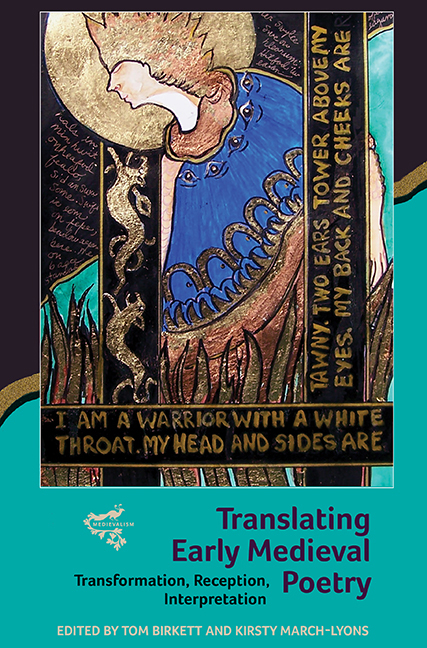Book contents
- Frontmatter
- Contents
- Acknowledgements
- Contributors
- Introduction: From Eald to New
- 1 From Eald Old to New Old: Translating Old English Poetry in(to) the Twenty-first Century
- 2 Edwin Morgan's Translations of Anglo-Saxon Poetry: Turning Eald into New in English and Scots
- 3 Gains and Losses in Translating Old English Poetry into Modern English and Russian
- 4 Borges, Old English Poetry and Translation Studies
- 5 ‘Let Beowulf now be a book from Ireland’: What Would Henryson or Tolkien Say?
- 6 The Forms and Functions of Medieval Irish Poetry and the Limitations of Modern Aesthetics
- 7 Aislinge Meic Conglinne: Challenges for Translator and Audience
- 8 Translating Find and the Phantoms into Modern Irish
- 9 Reawakening Angantýr: English Translations of an Old Norse Poem from the Eighteenth Century to the Twenty-first
- 10 Translating and Retranslating the Poetic Edda
- 11 From Heroic Lay to Victorian Novel: Old Norse Poetry about Brynhildr and Thomas Hardy's The Return of the Native
- 12 Michael Hirst's Vikings and Old Norse Poetry
- Afterword
- A Translation of Riddle 15 from the Exeter Book
- Bibliography
- Index
- Miscellaneous Endmatter
7 - Aislinge Meic Conglinne: Challenges for Translator and Audience
Published online by Cambridge University Press: 01 September 2018
- Frontmatter
- Contents
- Acknowledgements
- Contributors
- Introduction: From Eald to New
- 1 From Eald Old to New Old: Translating Old English Poetry in(to) the Twenty-first Century
- 2 Edwin Morgan's Translations of Anglo-Saxon Poetry: Turning Eald into New in English and Scots
- 3 Gains and Losses in Translating Old English Poetry into Modern English and Russian
- 4 Borges, Old English Poetry and Translation Studies
- 5 ‘Let Beowulf now be a book from Ireland’: What Would Henryson or Tolkien Say?
- 6 The Forms and Functions of Medieval Irish Poetry and the Limitations of Modern Aesthetics
- 7 Aislinge Meic Conglinne: Challenges for Translator and Audience
- 8 Translating Find and the Phantoms into Modern Irish
- 9 Reawakening Angantýr: English Translations of an Old Norse Poem from the Eighteenth Century to the Twenty-first
- 10 Translating and Retranslating the Poetic Edda
- 11 From Heroic Lay to Victorian Novel: Old Norse Poetry about Brynhildr and Thomas Hardy's The Return of the Native
- 12 Michael Hirst's Vikings and Old Norse Poetry
- Afterword
- A Translation of Riddle 15 from the Exeter Book
- Bibliography
- Index
- Miscellaneous Endmatter
Summary
AISLINGE MEIC CONGLINNE is a Middle Irish tale, the main text of which is contained in the Leabhar Breac, and dates to the first decade of the fifteenth century (although the language of the tale dates it to the late eleventh or early twelfth century). The tale has been relatively neglected, but it is difficult to understand why: it is one of the earliest European texts dealing with food-filled fantasy, is hilariously funny, and cynically observes clerical and political life in Ireland in the late eleventh century. There have been two major scholarly editions of the text: Kuno Meyer published an edition with a translation into English in 1892, and Kenneth Hurlstone Jackson published a much improved edition without a translation in 1990. In terms of popular versions, Austin Clarke published a verse drama based on the text called The Son of Learning in 1927. Influenced by Clarke's Dublin Verse-Speaking Society, Padraic Fallon also adapted the text in 1953 for his popular Radio Éireann play ‘The Vision of Mac Conglinne’. As for more traditional translations, there have been three since Meyer's in 1892: Tomás Ó Floinn translated the text into Modern Irish in 1980; Patrick Ford translated Jackson's edition into English in 1999; and my translation into English came out in 2010 with Syracuse University Press. I was able to do what no other translator has done: I replicated the metres of the original Irish verses, as well as some of the rhyme schemes and alliteration, although those latter items were a bit more difficult to simulate. The multiple references to food were one of the biggest challenges to me as a translator, and also possibly one of the reasons the tale may not have been translated recently: the references are often arcane at best, and at worst, the food being mentioned can no longer be identified (worse yet, the reader might wish that some of the images, such as men dressed in corned-beef coats, or rowing a boat through buttermilk streams under trees that drip meat juices, had never been imagined). This chapter focuses on these references to food, the challenges I faced trying to piece together exactly what food was being mentioned, what these food references can tell us about twelfth-century cultural life in Ireland, and why this might matter to a twenty-firstcentury English-reading audience.
- Type
- Chapter
- Information
- Translating Early Medieval PoetryTransformation, Reception, Interpretation, pp. 109 - 121Publisher: Boydell & BrewerPrint publication year: 2017



